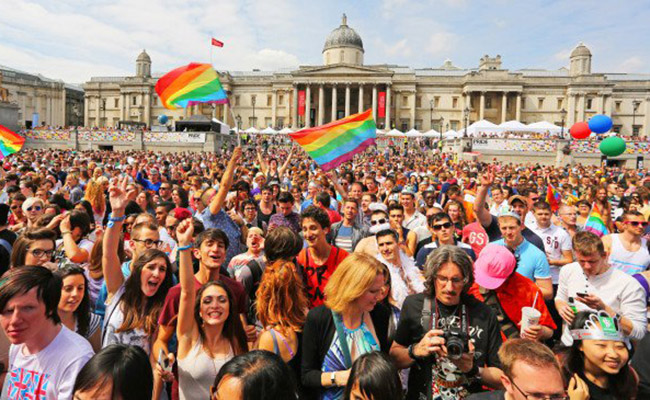Peter Tatchell calls march limit at London Pride ‘anti-LGBT discrimination’
The Mayor of London, Westminster Council and the Metropolitan Police set a 30,000 people limit and rejected 20,000 applicants

Peter Tatchell has criticised restrictions limiting the number of people that can march at London Pride.
The Mayor of London, Westminster Council and the Metropolitan Police have reportedly placed a 30,000 limit on the number of people who can march in today’s parade (July 7).
Sadly, over 50,000 people had applied to march in the parade and 20,000 of said applications were told they couldn’t participate.
In a statement, Peter Tatchell, a co-pioneer of Pride and Director of the Peter Tatchell Foundation pointed out there were no restrictions on other events such as the Notting Hill Carnival.

He said: “If there was no limit, 100,000 people would march, like in the 1900s. The limit on the size of Pride feels like anti-LGBT+ discrimination. There are no similar restrictions placed on the numbers at the Notting Hill Carnival, which is many times larger than Pride.”
“Tiny Dublin, with only a million people, had 60,000 people march at Pride last Sunday. London, with a population over eight times larger, will have half that number marching on Saturday. This is an LGBT+ and national embarrassment.”
LGBT+ organisations participating in the march were required to apply three months in advance, pay a fee and get wristbands for their participants.
Tatchell said: “The parade feels increasingly regimented, commodified and straight-jacketed. The authorities are enforcing punitive costs for road closures, pavement barriers, policing and security.

“They cite safety concerns and the disruptive impact on West End businesses if the parade was allowed to be bigger. It seems that commerce comes first.”
He continued: “Compared to 20 years ago, Pride has been dumbed down. For many people, it is now mostly a gigantic street party. Big corporations see it as a PR opportunity to fete LGBT+ consumers with their flashy floats. The ideals of LGBT+ equality are barely visible. Last year I counted only ten parade groups with an LGBT+ human rights message.”
“If Pride has gone adrift, we are all partly to blame for not being more involved with the organising committee and not standing up to the city authorities.”
Tatchell, who helped set up the first London Pride, then urged to Pride-goers to “reclaim it as a political march with a party atmosphere”.
“No limits on numbers on no motorised floats,” he said. “This would dramatically cut costs and bureaucracy; and return Pride to its roots. We can still have a fabulous carnival atmosphere.”
He added: “It worked in 1972. Why not now?”
